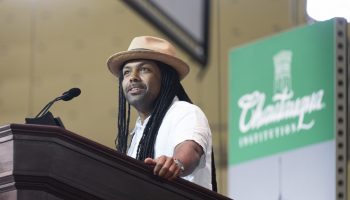
Wynton Marsalis was 22 years old when he won his first two Grammy Awards, becoming, in 1983, the only artist to ever win for both jazz and classical records. His father, Ellis Marsalis Jr., attended the ceremony in Los Angeles, but was careful to avoid feeding his second-eldest son’s ego.
“I was looking at him and he said, ‘I hope you don’t think that this means you can play,’ ” Marsalis said, quoting Ellis. “I’m so happy to have him here, because he is always for real.”
With his father watching from the audience, Marsalis considered the state of truth and freedom in America as he opened the final week of Chautauqua Institution’s 2019 season — “Exploring Race and Culture with Wynton Marsalis and Jazz at Lincoln Center” — with a lecture at 10:45 a.m. Monday, August 19 in the Amphitheater.
Marsalis structured his talk around an in-depth explanation of “The Ever Fonky Lowdown,” an intricate, board game-style composition that, in the tradition of his Grammy Award-winning “Black Codes (From the Underground)” and 2007’s “From the Plantation to the Penitentiary,” critiques the idea of American freedom through the prism of race. Marsalis and the Jazz at Lincoln Center Orchestra will perform “The Ever Fonky Lowdown” at 8:15 p.m. Thursday in the Amp.
Entering the Amp gates on Monday morning, Chautauquans received a program that outlined several of the “The Ever Fonky Lowdown” details upon which Marsalis elaborated in his lecture. After an introduction from Institution President Michael E. Hill — during which Hill reminded Chautauquans to avoid “an extended jam session” during the backstage meet-and-greet — Marsalis began by expressing gratitude for his parents and for their struggle “to get not just their portion of the American Dream, but to realize the dream of living and being recognized as a human being.”
He then launched into his artistic vision for the epic piece to be performed on Thursday evening.
“ ‘The Ever Fonky Lowdown’ is a game of buying in and selling out,” Marsallis said, describing how the piece is “written in symbolic language” and revolves around “leadership exploiting followers” through bluster and the promulgation of stereotypes.
“Who is we, and who are they?” Marsalis asked. “ ‘The Ever Fonky’ examines the integrity and results of the culture we create every day by serving the tension between our dream vision, television, mythology and the underlying facts that we have actually experienced.”
The players of “The Ever Fonky” game include “The Hustler,” otherwise known as Mr. Game; the “Rubes,” or O Glorious People, Mr. Game’s followers; the “Rebel,” or activist, community organizer and civil rights leader Fannie Lou Hamer; and the “Savior” — the piece’s “moral compass.”
“The game is about gaining the confidence of everyday people and exploiting us into accepting a predatory narrative that creates greater wealth and comfort for us, and poverty and pathology for them,” Marsalis said.
The goal is to make “us” comfortable with that narrative, and to promote “the forever war between the haves and have-nots.”
According to Marsalis, there are seven objectives of “The Ever Fonky Lowdown,” and the achievement of those objectives determines if a player earns five available “prizes” at the game’s end.
However, no matter how a player plays, the conclusion leads back to the beginning — a “Return to start” card on loop.
First, Marsalis said, Mr. Game convinces O Glorious People to join him in the name of freedom. Then, he introduces the falsely nefarious presence of “others” as a crooked basis for community, followed by a “gang-recruiting” method of perpetrating acts of violence against those “others” in order to solidify the bonds of his expanding empire. Although O Glorious People might have qualms about their participation, they experience the associative glory, “like wearing their favorite team’s football jersey.”
Breaking laws requires that Mr. Game and his Rubes must justify their actions by rewriting legislation and reframing offensive attacks as defensive — protection against the crimes of the “others” who haunt our midst. Mr. Game forces the persecuted “others” to “get on board” and then forgoes any memory or responsibility for the horrors he has committed.
For Marsalis, the first half of “The Ever Fonky Lowdown” ends on a note of “enjoyment and laughter,” while a voice of the dispossessed repeatedly screams, “But what would the savior think?” A disembodied voice responds: “The word is the will of God, not the will of the people.”
In the second half of the composition, Mr. Game gives players five “non-partisan prizes”: the freedom of segregation and homogenization; freedom from romance; “prime time pornography and the commodification of community”; constant surveillance; and finally, after players reject the revolutionary ideas of Fannie Lou Hamer, “freedom from thought and constructive engagement.”
Marsalis also described the “sirens” within the piece — singers who attempt to seduce with wisdom — and the three young men who dance to “represent the sweep of our youth going through the gauntlet of experiences that is ‘The Ever Fonky Lowdown.’ ”
As they dance, Marsalis said, they try to emerge from the “Lowdown” with their sanity, humanity and optimism intact — a tribute to Ralph Ellison’s Invisible Man.
“We are the winningest winner in the whole wide world,” Marsallis said, inhabiting Mr. Game and the Glorious People in a Dr. Seussian-esque patter.
Despite the sweet-talking, con-man personality of Mr. Game, “The Ever Fonky Lowdown” is “not about (President Donald) Trump,” Marsalis clarified.
“It’s easy to put it on him,” he said. “Is the Klu Klux Klan why our education system is segregated? … Is that why our judicial system is the way it is, because of the Klan? … Is that because of the president? Or is that something in our character? Is it just us?”
That, he said, is the central question of “The Ever Fonky Lowdown” — and it’s also why audiences stop laughing as the piece moves from the first half to the second. Marsalis summarized his argument with an anecdote about Marcus Roberts, a pianist with whom he played gigs for seven years.
“Marcus said, ‘When something goes wrong on the bandstand, I just assume it’s me. So that way, I’m doing everything that I can be doing to make everything right,’ ” Marsalis said, quoting Roberts. “The twist is, you have a choice to fight for something that isn’t directly benefiting you or not.”
Tracing his journey from his childhood in New Orleans, to his adult life in New York, Marsalis confided that “all of the perspectives (in ‘The Ever Fonky Lowdown’) are things that I’ve experienced.”
“ ‘Ever Fonky’ means it is a groove that has been established across time and space,” he said. “ ‘Lowdown’ is the actual truth that exists beneath the public scope.”
Marsalis rejected the notion that the United States is the greatest country in the world, and asked what citizens can do “to rein ourselves in, in our stupidity, our greed, our callousness, our lack of concern for the condition of others as long as we don’t see them.”
“Where do we go from here?” Marsallis asked. “That’s what ‘The Ever Fonky Lowdown’ tells us and leaves us with: Where do we go from here? It’s not ‘Don’t elect Trump.’ It’s not ‘The Klansmen or the people in the middle of the country (are causing all the tension).’ There’s no real left or right. … We’re in a position, and we need to wake up, and we need to fight for the country we want to see.”
To manifest that future, he argued, people need to do more than protest online. He encouraged the audience to fight for economic justice, and to abolish mass imprisonment and indiscriminate warfare.
“We are the United States of America,” he said. “We already have a history full of blood.”
Listing normalized injustices of the modern era — presenting identification at every checkpoint, encountering a room devoid of diversity, paying $800 for a bottle of pills necessary for survival — Marsalis urged the people filling the Amp seats to constantly ask themselves: “Am I free?”
“With ‘The Ever Fonky Lowdown,’ the only thing I’m trying to do is pull the covers off of something and say, ‘Hey, let’s look at who we actually are,’ ” he said. “We’re in a tough spot. This is the time to assess who we are and step up to the plate and be for real about what we’re supposed to be about.”





